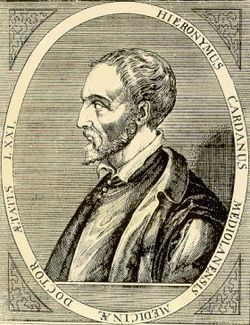Jerome Cardan
| Gerolamo Cardano | |
|---|---|

Gerolamo Cardano
|
|
| Born |
24 September 1501 Pavia |
| Died | 21 September 1576 (aged 74) Rome |
| Nationality | Italian |
| Fields | Science, maths, philosophy, and literature |
| Alma mater | University of Pavia |
| Known for | Polymath, founder of various fields and inventor of several machines |
| Influences | Archimedes, Muḥammad ibn Mūsā al-Khwārizmī, Leonardo Fibonacci |
| Influenced | Blaise Pascal, Pierre de Fermat, Isaac Newton, Gottfried Wilhelm von Leibniz, Maria Gaetana Agnesi, Joseph-Louis Lagrange, Carl Friedrich Gauss |
Gerolamo (or Girolamo, or Geronimo) Cardano (Italian: [dʒeˈrɔlamo karˈdano]; French: Jérôme Cardan; Latin: Hieronymus Cardanus; 24 September 1501 – 21 September 1576) was an Italian polymath, whose interests and proficiencies ranged from being a mathematician, physician, biologist, physicist, chemist, astrologer, astronomer, philosopher, writer, and gambler. He was one of the most influential mathematicians of the Renaissance, and was one of the key figures in the foundation of probability and the earliest introducer of the binomial coefficients and the binomial theorem in the western world. He wrote more than 200 works on science.
Cardano partially invented and described several mechanical devices including the combination lock, the gimbal consisting of three concentric rings allowing a supported compass or gyroscope to rotate freely, and the Cardan shaft with universal joints, which allows the transmission of rotary motion at various angles and is used in vehicles to this day. He made significant contributions to hypocycloids, published in De proportionibus, in 1570. The generating circles of these hypocycloids were later named Cardano circles or cardanic circles and were used for the construction of the first high-speed printing presses.
...
Wikipedia
